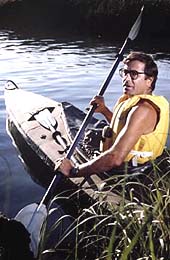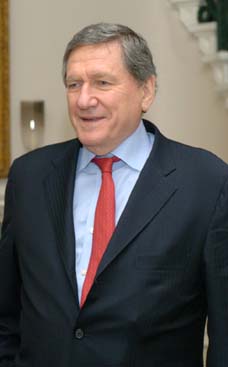
There's a good reason why people fly first-class and stay in luxury hotels: it's an awful lot of fun. But I do think that if a traveller wishes to know how people live, and wishes to gain a little insight in a country, it helps to travel on the ground and stay in simpler places that might not have a big wall around them. Overland travel is obviously more difficult and time-consuming, but it is much more revealing. I could have hopped from capital to capital in travelling through Africa for "Dark Star Safari", but African capitals new buildings surrounded by preposterous slums are places to avoid. And you can't say that you have travelled anywhere unless you have crossed a frontier in a literal and also figurative sense. "Becoming a volunteer teacher in Africa with the Peace Corps changed my life. I was in a bush school, with wonderful students, absolutely cut off no telephone, no computer. And because I was cut off I had to make friends, learn the language (Chichewa) and get to know the area. I realised that Malawians had dreams of transformation just like mine. I assumed that the Africans I knew would become teachers and doctors, following the example of foreign volunteers. This did not happen, as I saw to my dismay 40 years later." Author Paul Theroux served as a Peace Corps Volunteer in Malawi in the 1960's.
Paul Theroux promotes Responsible Tourism
Responsible Tourism Awards: Paul Theroux on why the awards matter
Nominations are now open for this years Responsible Tourism Awards, sponsored by Virgin Holidays and organised by responsibletravel.com. Paul Theroux, the veteran travel writer, explains why the awards matter, and singles out some countries that deserve to be among the winners.
Last Updated: 10:13AM BST 03 Apr 2009
Why are you supporting The Virgin Holidays Responsible Tourism Awards?
In the past, awards were given for Best Meal, Best View, Most Grovelling Staff, Biggest Ballroom, or whatever. It's encouraging that someone is being rewarded for doing something that is ethically right or supporting a position that will help the planet. That's the greatest lesson of travel: it is a very small and easily bruised planet.
"Dark Star Safari" was one of the best travel books ever written about Africa because you caught buses, walked and connected with local people. Do you think there is something rather superficial and thus irresponsible about the way some of us travel now flying first-class to stay in luxury hotels?
There's a good reason why people fly first-class and stay in luxury hotels: it's an awful lot of fun. But I do think that if a traveller wishes to know how people live, and wishes to gain a little insight in a country, it helps to travel on the ground and stay in simpler places that might not have a big wall around them. Overland travel is obviously more difficult and time-consuming, but it is much more revealing. I could have hopped from capital to capital in travelling through Africa for "Dark Star Safari", but African capitals new buildings surrounded by preposterous slums are places to avoid. And you can't say that you have travelled anywhere unless you have crossed a frontier in a literal and also figurative sense.
How did your early experience volunteering in Malawi shape your attitude towards local people and poverty while travelling?
Becoming a volunteer teacher in Africa with the Peace Corps changed my life. I was in a bush school, with wonderful students, absolutely cut off no telephone, no computer. And because I was cut off I had to make friends, learn the language (Chichewa) and get to know the area. I realised that Malawians had dreams of transformation just like mine. I assumed that the Africans I knew would become teachers and doctors, following the example of foreign volunteers. This did not happen, as I saw to my dismay 40 years later.
Of all the places you have been, which stand out for you as having maintained a strong sense of place a distinctive local character as opposed to an identity assigned to them for tourism purposes?
This is a hard question; all places change, because of politics, modernisation, conversion to another religion, or simple corruptions. But I would single out Bali, the people of the Trobriand Islands, many of the villages in Vanuatu (New Hebrides), the remoter parts of Scotland and the lobstering communities on the coast of Maine. People who are proud of their traditions, who have faith, and who have retained their language and their special skills agricultural or nautical, or artistic skills survive as happy people and tend not to envy what others possess. I would say also that these people tend to be the most responsible in environmental terms.
Do you think it's possible as a traveller really to connect with a place? Should we even aim for this? Where have you felt most and least connected to during your travels?
I felt the most connected in Malawi, because I was completely unconnected to the wider world. I have felt unconnected in Japan because of the language barrier and what seemed to me a somewhat impenetrable culture. But I have also felt utterly alien on a rainy Sunday afternoon in Macclesfield.
Do you believe that tourism can play an important part in conservation efforts within destinations?
Yes, of course, especially if the tourist goes armed with a little information. But the hotels and the local infrastructure bear the most responsibility. The tourist is merely visiting: here today, gone tomorrow.
We hear a great deal about how train travel is greener than flying, but aside from any environmental benefits, what is it about train travel that you have always really loved? And what is it that you dislike about flying?
Apart from the speed of it, air travel is hideous but everyone knows that it is stressful, germ-laden and uncomfortable. I have always liked the elbow room on a train, and that fact that you can read, write, walk around, chat to strangers, look out the window, loiter in the vestibule and, on the better trains, have a good night's sleep. I took an overnight train from Berlin to Paris recently and had a bedroom and a shower stall. Last year I took a long train trip from Calcutta to Assam not a smart train but a trip full of excitements and discoveries.
What are your reasons for rarely taking a camera on your travels?
I am no good at taking pictures, or even keeping them straight after I've taken them. Cameras need maintenance, they get stolen. And they are a major distraction to someone who wishes to concentrate on a scene and make notes.
Tour operators are seeing a large increase in British people travelling closer to home. Do you have fond memories of specific places in Britain from your time spent living here?
The British countryside always beckoned. When I got restless in London, I used to take the overnight train to Inverness with my bicycle, and then would get off in the morning in the Highlands and set off cycling along the lochs, sometimes detouring to the islands, or heading south towards Glasgow, and the train home. At other times I hiked in the Cotswolds with my wife, or alone. There was a kayak centre near St David's in South Wales where I would go paddling three or four days. The happiest memories I have are of staying in country-house hotels in Scotland and Yorkshire with my wife and two children and spending the days walking and talking. Even then I thought how I wanted it all to last, and reflected, "Look thy last on all things lovely, every hour "
You live in Hawaii. Do you spend much time exploring or holidaying closer to home?
I live in a countrified place, with beehives and bamboo and geese. I ride a bike on back roads when the surf is too high to swim or paddle in; when the sea is fairly calm I paddle a kayak. Pretty much my routine when I lived in Britain. I think it's clear that I'm not a city slicker.
Do you have any tips for travelling responsibly?
Always bear in mind that no matter how hard a time you're having, the people you are travelling among have it much worse.











